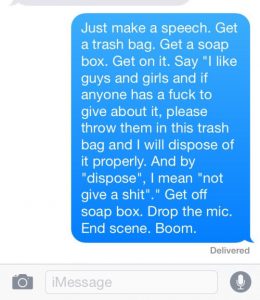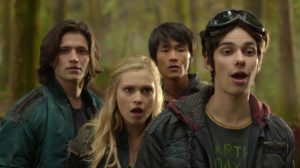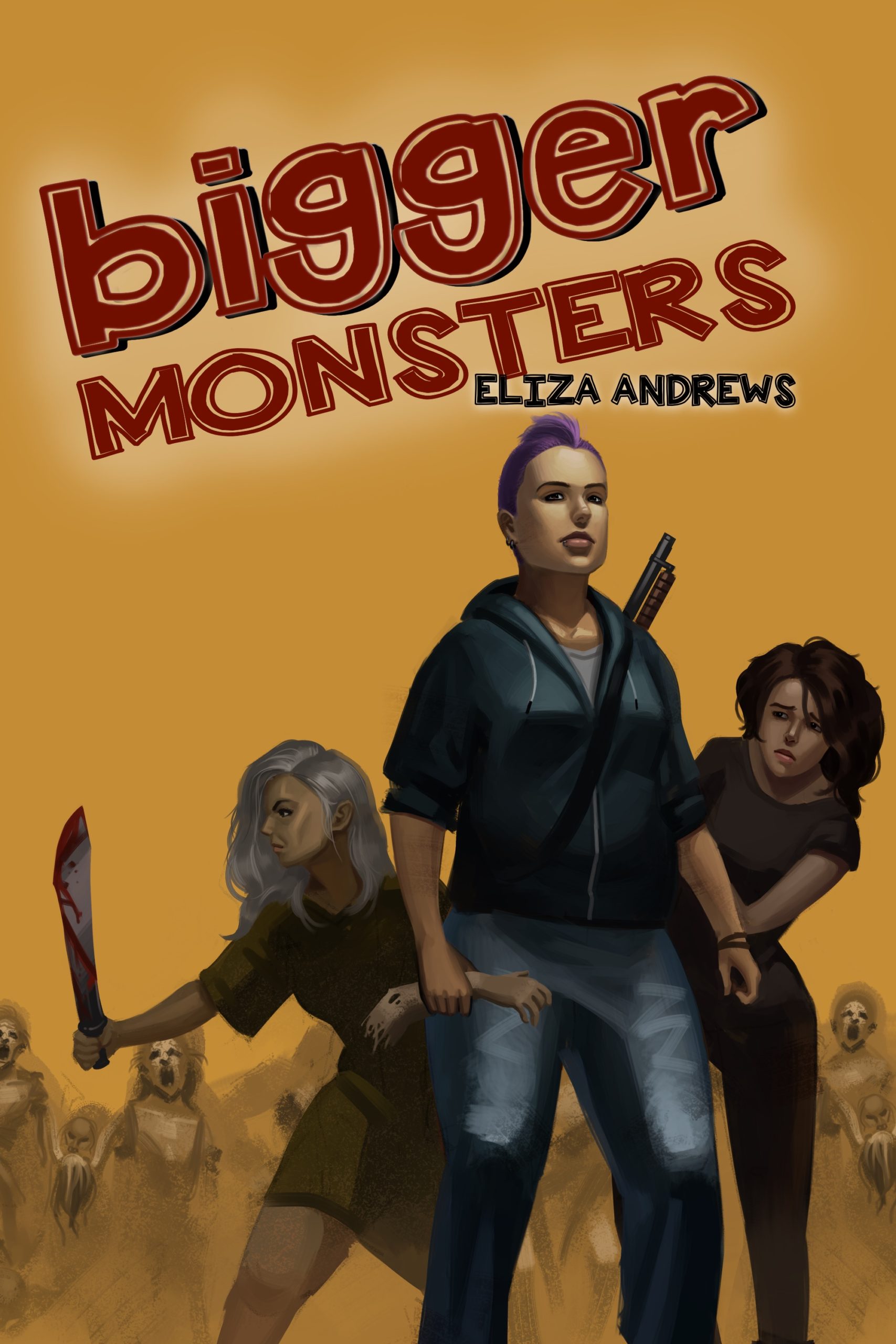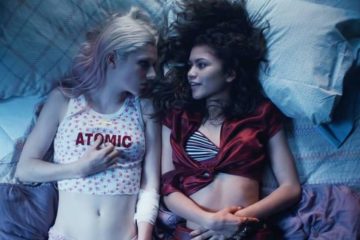(Or: I’m kind of tired of traditional coming out storylines)
It’s Thanksgiving weekend, y’all. You know what that means? TV and movies. Lots and lots and lots of them. Along with some novel reading and some novel writing.
I just watched what I would characterize as a good, maybe even great, lesbian film: First Girl I Loved. Trailer’s above. Go ahead and watch the trailer if you haven’t seen it. I’ll wait.
Synopsis & Review
Anne is an high school girl who’s crushing hard on Sasha, who’s crushing hard right back. The opening few scenes have Anne trying to confess / come out to her best friend Cliff, mingled together with some very awkward (cute!) teenage flirting between Anne and Sasha.
Anne’s the weirdo. Sasha’s the good girl. Anne knows (or is proactively moving in the direction of knowing) that she’s gay. Sasha moves in this same direction at first but then rejects Anne later, giving us the oh-so-stereotypical line, “I’m not like you.”
Girl A meets girl B. Girl A falls in love with girl B. But then, uh-oh: Girl B tells Girl A, “I’m not actually gay; I’m not like you.” That’s the beginning of about a million lesbian movies.
In other words: You’ve seen this movie before.
You saw echoes of it in Lost & Delirious (though First Girl I Loved was def better and far less depressing), in Heavenly Creatures
(which was even worse / scarier / more depressing than Lost & Delirious); you saw this storyline on television with Faking It, at the beginning of Cosima / Delphine’s relationship on Orphan Black
, plus in other TV shows that I’m probably not remembering; and you’ve not only watched this story, you’ve *read* this story with Madeline George’s The Difference Between You and Me
and NUMEROUS other books
.
As an honorable mention within this same “I love you” / “Sorry, I’m not gay” coming out genre, there’s also D.E.B.S. and But I’m a Cheerleader, rom-coms which undermine the trope in a fun and campy way.
In the happy ending movies, Girl B has an epiphany that, “OH! Actually, damn. You know how my tongue tripped and fell into your mouth earlier? Turns out I really *am* gay. Let’s live happily ever after.” That’s Orphan Black (not so sure about happily ever after; let’s wait for Season 5), D.E.B.S., and But I’m a Cheerleader.
In the Psycho Lesbian trope movies (Lost & Delirious; Heavenly Creatures), the ending is much messier and more tragic.
Then there are the “It’s a shitty ending, but rah rah lesbian empowerment! What doesn’t kill ya makes ya stronger!” tales, which I’d say First Girl I Loved and Faking It both fall into. (Also perhaps Kissing Jessica Stein, which is mildly cute but probably the straightest lesbian movie ever made.)
 Can I just say I’m tired of this storyline?
Can I just say I’m tired of this storyline?
Here’s my central thesis: No more of this Gayngst trope-centric coming out theme.
Look, First Girl I Loved is a *good* movie. And there are so many bad lesbian movies out there, so I feel like it’s important to start with this acknowledgment. This movie is well-written, well-acted, has some interesting subplots (especially Anne’s relationship with Cliff). It’s got layers and depth, and it doesn’t have that B-rate movie so many lesbian movies do.
Also, angsty coming out stories have their place, for sure. I’m sure they always will. For the foreseeable future, despite living in this *extraordinarily* more flexible and tolerant day and age, coming out is still not easy. And, truth? Many of us *do* fall for (straight / bicurious) female friends during our coming out process before we finally manage to choose someone who’s actually into girls.
(I did it myself. Twice.)
So I get it. I know why this storyline exists.
But.
BUT… pbbbbbbbbbh. (That’s the sound of me blowing a raspberry, by the way, sticking out my tongue like, “Ugh!”)
I just don’t have any patience for the Tragic Gay anymore, with his or her Tragic Gay Coming Out / Coming of Age tale. I’m just *done.* This sums up my feelings perfectly:
Gayngst is a Pet Peeve Trope of many because while it usually portrays gay people sympathetically and addresses an issue many gay people in Real Life go through, it can be interpreted as saying that it’s impossible to be gay without being miserable, or that gay people don’t deserve Happy Endings, or at its very worst and most ineptly-handled, gay relationships are innately disastrous. However, Gayngst is still unfortunately common in real life. After all, True Art Is Angsty transcends sexual orientation.
And I feel like, as artists, we need to move past this and start telling other stories.
I do not want to watch the same lesbian movie / television show / read the same lesbian novel over and over again, y’all.
Let me repeat that: I. Do. Not want. To watch. The. SAME. Lesbian movie. Over. And. Over. And. Over. Again.
This is 2016, folks. And yeah, we in the U.S. just elected Trump / Pence, so obviously we still have some work to do, but still — it’s a different world for LGBTQ people than it was when I was coming out a couple decades ago. I just don’t think the storyline of First Girl I Loved has quite the same resonance that it did in the 90s / earlier.
On top of that, I think this “I love you” / “Sorry, I’m not gay” storyline just reinforces the Tragic Gay trope in which coming out is destined to be painful and queer people are destined to be miserable.
Yes, art reflects life, but also, life can be informed by art. So why continuously tell ourselves the same stories that coming of age as an LGBTQ kid will definitely be painful? Why not flip the script? Why not start telling more “first love” stories that have the look / feel of a straight “first love” story, in which the gender of the characters is secondary? That’s what (generally speaking) we want as LGBTQ people anyway, right? To be treated as people first, queers second? So why do the stories we tell ourselves still so frequently prioritize the angst and pain?
What I’m trying to say is this: The media we consume has the power to influence both how we see ourselves and the conversations we have as a society. That’s why I don’t want to keep reading / watching the “I love you” / “Sorry, I’m not gay” storyline again and again. I want us to use our power as artists to change what coming out looks like and feels like.
I want coming out to become not-a-big-deal. And I want there to be more stories that make it not-a-big-deal so that we can get to that point as a society.
Terribly sorry, but this is why I’m still hung up on The 100.
(Ooops, is my Clexa obsession showing again? Sorry.)
It’s the not-a-big-deal thing that made The 100 nearly picture-perfect until JRoth +writers royally screwed it up. You’ve got a couple of strong women who end up together, drawn to one another not primarily because of orientation, but because they *get* each other in a way no other character on the show could ever get them.
When Lexa first kisses Clarke in S2E14, I fully expected the “Thanks, but I’m not like you” moment. It *felt* like it was coming. It’s what normally comes in this moment when the tomboy kisses the femme girl. And I was waiting for Clarke to say it. But then Clarke says something totally different instead. Check out the clip:
At 1 minute, 11 seconds, we as audience members are all set up for the line. Remember, at this point in the show, we know that Lexa’s gay, and we’ve seen some tension between Clarke and Lexa that’s ambiguously sexual, but we don’t have any real indication that Clarke’s bi / gay (except for maybe the way she ogles semi-naked Octavia in the pilot — see below). In fact, the last person we’ve seen Clarke with is Finn.

Oh my. Look at Clarke checking out Octavia.
So we’re waiting for the “I love you” / “Sorry, I’m not gay” line because — here’s the important part, pay attention: We’ve been conditioned to expect it by stories like this. But what does Clarke say instead?
“I’m sorry. I’m not ready… to be with anyone… Not yet.”
Ask yourself, why did the fandom so totally flip out over Clexa? Because we were expecting your normal, run-of-the-mill “I’m sorry, I’m not like that” Gayngst trope to be followed a few episodes later by, “Oh! I am like that!” or “No, really, I’m not like that.”
The writers flipped out the fandom by flipping the script. They sent a clear signal that this was going to be a *different* kind of gay story. A story without the Gayngst. With no Tragic Gay. With no Psycho Lesbians.
And why do you think the fandom flipped out AGAIN over Lexa’s death? Because, after defying our expectations like that, *finally* giving a story about ourselves that didn’t have to include some big coming out melodrama, JRoth pulled the rug out from underneath us by sending us right back into Tragic Gay / Bury Your Gays land.
But what Clexa got right was…
The 100 got the ending of Clexa wrong. What it got right was skipping over the whole Tragic Gay coming out tale. As cultural norms shift — and as we work to shift cultural norms as LGBTQ people and artists — it’s going to become more and more normalized for people to come out without a whole lot of angst and fanfare. Excuse me for saying so, Old School lesbians, but, while I’ve got mad respect for you and what you’ve had to fight for and go through in your life, the storyline of First Girl I Loved and tales like it *just doesn’t resonate* with people under, say, 35 as it once did. I’m positioned in between the Baby Boom and the Millenials, and for me, I don’t want any more First Girl I Loved. I want more Clexa.
Call to action for artists of all types: Less Gayngst. No more Tragic Gays. More Clexa (minus the Tragic Gay death scene).
Whooooo
Now THAT was long-winded. What do you guys think out there? Am I right? Am I way off? Be brave and kick off a conversation in the comments section below.



1 Comment
Amy · November 29, 2016 at 8:17 am
100% AGREED!! Less angst please.